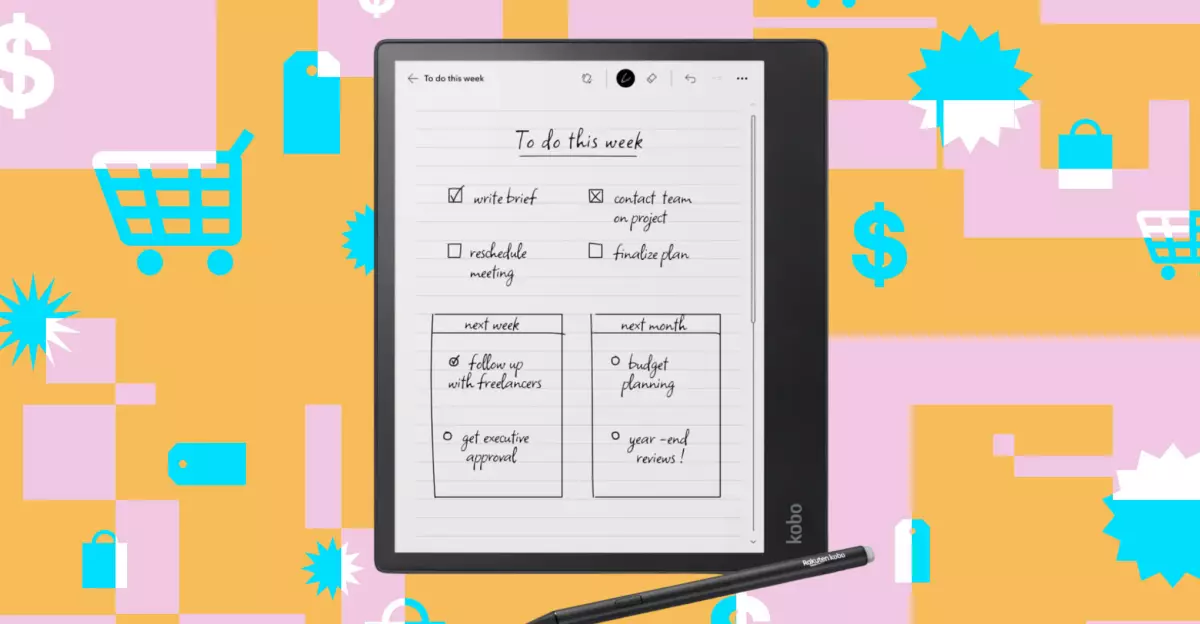In the crowded market of e-readers, Kobo’s Elipsa 2E stands out as a compelling choice for anyone seeking a seamless blend of reading and note-taking. Priced at an unprecedented $349.99—a significant $50 dip—it presents a powerful alternative to Amazon’s Kindle Scribe, a device often regarded as the market leader in this niche. The Elipsa 2E rewards users with a spacious 10.3-inch display that not only offers crisp, clear text but also doubles as a virtual notepad thanks to its responsive stylus. This capability to annotate directly on ebook pages—whether jotting margin notes, circling passages, or sketching ideas—brings a natural, paper-like interaction not commonly found in e-readers.
What makes the Elipsa 2E particularly attractive is its flexible annotation system. While Amazon’s Kindle Scribe permits some on-page writing, it lacks fluidity; users often find themselves constrained, unable to freely circle text or highlight without cumbersome menus. By contrast, the Elipsa’s intuitive interface and handwriting-to-text conversion elevate the digital reading experience far beyond traditional boundaries. This is more than just a gadget for book lovers—it’s a tool designed for creatives, students, and professionals who demand both reading comfort and interactive engagement.
Kobo Libra Colour: Bringing Reading to Life with Subtle Hues
For those who want a less bulky device without sacrificing innovative features, the Kobo Libra Colour offers a punchy alternative. At a discounted price of $209.99, this device should not be underestimated simply because of its smaller 7-inch screen. Its color display ushers in a new dimension for e-readers, where highlights, annotations, and graphic-rich content like comics come alive far better than on plain monochrome screens. Although Amazon’s Kindle Colorsoft edges it out with slightly more vivid color output, the Libra Colour compensates with comfort and practicality. Its display is easy on the eyes, even during prolonged reading sessions.
A distinct advantage of the Libra Colour is its physical page-turn buttons—a feature that many readers miss on touchscreen-only devices—and its compatibility with a stylus (sold separately) for note-making or marking up text. These features enrich the reading experience in subtle ways that matter in daily use. Additionally, Kobo’s broader file format support and integration with OverDrive to borrow public library books directly are huge boons. While the inability to natively support Amazon’s Kindle book format remains a drawback, it’s a manageable inconvenience given the ease of converting files and Kobo’s openness toward diverse digital content.
Essential Tech Accessories: Power and Convenience on the Go
Beyond e-readers, several savvy gadget deals recently surfaced that enhance everyday tech life. Belkin’s BoostCharge Pro 3-in-1 Wireless Charging Stand, now available at $99.99, packs a robust punch in a sleek form factor. This stand can simultaneously charge a MagSafe-compatible iPhone at up to 15W, an Apple Watch using a dedicated 5W puck, and an additional Qi-enabled device such as AirPods or Android smartphones. The convenience of charging multiple devices at once with fast power delivery is appealing for tech enthusiasts who juggle Apple ecosystems. Especially noteworthy is its support for fast charging Apple Watch Series 7 and newer models, offering a practical upgrade over standard chargers.
Equally impressive for travelers and minimalists is Anker’s 511 Charger, on sale for a jaw-dropping $12.99. Despite its compact size and foldable prongs designed for portability, this 30W USB-C charger packs enough power to quickly charge smartphones, earbuds, tablets, and some laptops. Anker has built a reputation for creating reliable, power-dense chargers, and this model embodies that legacy well. It’s a perfect example of how thoughtful engineering meets real-world convenience, filling a much-needed niche for handheld, potent charging solutions.
Yeedi Cube: Affordable Robotic Cleaning with Smart Mapping
In the smart home arena, the Yeedi Cube robot vacuum emerged as another exceptional value. Priced at $199.99—a staggering drop from its original $470—the Cube offers robust 5,100Pa suction power, capable of picking up dirt and debris effectively across various flooring types. While it may not boast the highest-end AI-driven obstacle avoidance seen in premium models, its ability to map multiple rooms and assign “no-clean” zones via an app offers considerable control to users. For households seeking a reliable robotic vacuum without splurging on luxury features, the Yeedi Cube balances price and performance expertly.
One might criticize it for lacking advanced AI navigation, but for many users, this simplified yet competent approach is preferable. Lower complexity often means fewer glitches and easier setup—a critical consideration for people new to robot vacuums or those irritated by overly complicated devices. The Yeedi Cube exemplifies that smart cleaning can be accessible, functional, and affordable without cutting corners on core performance.
A Renewed Focus on Practicality and User Experience
What binds all these tech deals—Kobo’s e-readers, the charging devices, and the Yeedi Cube robot vacuum—is a shared emphasis on practical usability blended with thoughtful design. In today’s gadget landscape, it’s easy to chase flashy specs or brand prestige, but these products demonstrate the value of real-world features that genuinely enhance daily life. Whether it’s flexible note-taking on a stylish e-reader, onboard multitasking chargers that reduce cable clutter, or a straightforward robotic vacuum that does its job well, the best technology is ultimately about meeting user needs with elegance and efficiency.
The subtle victories of brands like Kobo and Anker, along with Yeedi’s intelligent design, remind us that innovation need not always be revolutionary or costly—it often thrives in fulfilling practical expectations, refining user experiences, and offering smart solutions at accessible prices.

